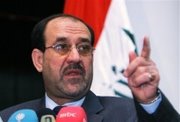Syria says it will allow 181 refugees who have been stranded at the Iraq-Jordan border.
 Human Rights Watch made an urgent appeal to the Jordanian government when the Palestinians became trapped between the checkpoints over a month ago. The Jordanian border was open, but when the border guards realised Palestinians and not Iraqis were coming across, they shut the gate. The Iraqi border guards wouldn't let them back in, and they've been trapped in no-man's-land ever since.
Human Rights Watch made an urgent appeal to the Jordanian government when the Palestinians became trapped between the checkpoints over a month ago. The Jordanian border was open, but when the border guards realised Palestinians and not Iraqis were coming across, they shut the gate. The Iraqi border guards wouldn't let them back in, and they've been trapped in no-man's-land ever since.
The charity was not even asking for the Palestinians to be allowed to stay in Jordan - just to be allowed transit through Jordan to setttle in a third country.
"Jordan is slamming the door in the face of a small, but desperate group of people, who have seen their relatives murdered in Baghdad,” said Bill Frelick, refugee policy director at Human Rights Watch. “Jordan should not treat Iraqi Palestinians fleeing persecution more harshly than other Iraqis fleeing violence, who have generally been allowed to enter Jordan.”
The aid workers looking after them have described the desert conditions they are living in as extremely harsh. It is remeniscent of the situation during the first days of the war in 2003. Jordan refused to let Iraqi refugees in, but they did allow the Red Cross to open refugee camps just inside their borders. When the refugees flooded in to the camps, they became trapped - not allowed out of the camps into Jordan, and not allowed back in to Iraq.
As the most recent batch of Palestinian refugees approached the border, they were turned away by the racist Jordanian soldiers. They tried to return, but they were shot at by the Iraqis.
Apparently only Iraqis are allowed in to the promised land of Jordan.








